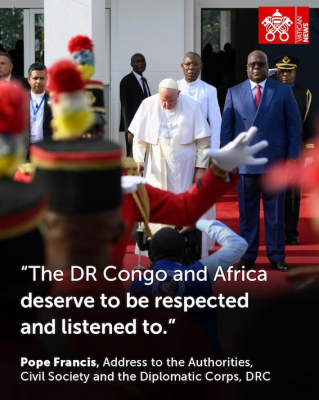Pope Francis begins his Peace Mission to DR Congo

In advance of Pope Francis's visit to Democratic Republic of Congo (DRC), which began today, Catholic leaders, charities and missionary groups have been pointing out the structural causes of the country's problems - particularly minerals extraction and related violence. For years, the Central African country has struggled with instability and poverty despite its vast mineral wealth.
About 45 million people of the DRC's estimated population of 100 million are Catholics. More than a million people are expected to attend an open-air Mass that Pope Francis is to celebrate on Wednesday at Kinshasa airport.
Bishop Jean-Pierre Kwanbamba of Kengue diocese, hopes that many will become peacemakers after the Pope's visit. He said: "the Pope is coming to comfort us, to strengthen our faith, to encourage us and he is coming to talk about peace so it should make us all peacemakers."
Despite its natural wealth, "Congo also embodies social injustice, the scandal of underdevelopment and poverty", according to Samuel Pommeret from the French Catholic nongovernmental organisation CCFD-Terre Solidaire. Francis, the first pope to visit DRC since 1985, "could also deliver a message for the economic actors who benefit from these riches," Pommeret said.
"There's a race between China and the US because of critical natural resources like lithium, cobalt and copper," according to Congolese Jesuit Fr Jacques Nzumbu; "to win the competition, you need these minerals and Congo is suffering because of this competition."
"The Pope's voice will be hugely encouraging for the country but will also be a strong spur to the political classes to resolve the country's problems," said Mauro Garofalo, head of international relations at the Rome-based Sant'Egidio community.
DRC is a traditionally Catholic nation of around 100 million people in central Africa, plagued by poverty despite its vast mineral wealth. Among the armed groups operating in DRC's east are the Allied Democratic Forces, which the Islamic State group claims as an affiliate and which bombed a Pentecostal church in Kasindi on 15 January, killing 14 people. The group reportedly chose to carry out the attack on a Sunday as the church was full and celebrating baptisms. The bomb was placed in the middle of the congregation.
One Catholic priest in the DRC denounced what he describes as "international indifference" in the face of acts of terror sweeping parts of the country. Fr Marcelo Oliveira, a Comboni missionary priest responsible for North Kivu eastern province, spoke to Catholic charity Aid to the Church in Need days after the attack on the Kasindi church.
"Terror is widespread", Father Oliveira said, "and this is what gets to us, as missionaries, seeing the silence of the international community, the deafening silence, while human lives are massacred." He reported that various armed militias strike fear and insecurity. "Attacks are common in this area of North Kivu…and the rebels have the habit of attacking villages and spreading terror among the people, who are then forced to flee and hide in the forest until the militias leave again." He felt their goal is to get people to run, "so that they can take part of their land, which is full of natural resources."
As Pope Francis flew over the Sahara earlier today, he asked for a prayer for those who have died trying to cross the desert and the Mediterranean Sea, saying, "we pray for those people."
He was welcomed to Kinshasa by thousands of people on the streets before an official welcome from President Felix Tshisekedi at the presidential palace. The country's civil and religious authorities and diplomatic corps were present.
In his talk the president talked about the need to protect DRC's biodiversity and mineral resources from exploitation and the activity of armed groups. He acknowledged the challenge of climate change.
"Your country is a diamond of creation but your people too are of inestimable worth" said Pope Francis in his speech. He lamented "the scourge of war" and "deplorable attempts to fragment the country", saying he was bringing, "the consolation of the Catholic Church". He condemned political and economic exploitation of DRC and of Africa in general, highlighting "the poison of greed". The Pope was clapped when he said: "Hands off DRC, Hands off Africa. May the world acknowledge the terrible things done over the centuries to people here."
Pope Francis felt, "we cannot grow accustomed to the bloodshed that has marked this country for decades, causing millions of deaths and the current peace processes, which I greatly encourage, need to be sustained by concrete deeds, and commitments should be maintained".
He felt there is a special responsibility to young people of DRC, lamenting child labourers in mines and young girls abused, and told people in office that, "power is only meaningful if it is a form of service - avoid the rush to a quick profit". He called for the shunning of those who would foment violence or make shameful business deals, saying "tackle the darkness of corruption and injustice." He urged attention to education, healthcare and being "good stewards of creation," concluding with: "Undertake a courageous social renewal. I stand with you and accompany with my prayers. God bless the entire Congolese nation."
Vatican News Facebook is carrying the visit live: www.facebook.com/vaticannews/
See the Pope address to civil, religious authorities and diplomatic corps: www.youtube.com/watch?v=gsRDIs-b7u0


















